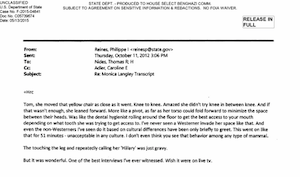WASHINGTON -- The FBI has begun an examination of the security of Hillary Rodham Clinton's private email setup, contacting in the past week a Denver-based technology firm that helped manage the unusual system, according to two government officials.
Also last week, the FBI contacted Clinton's lawyer, David Kendall, with questions about the security of a thumb drive in his possession that contains copies of work emails Clinton sent during her time as secretary of state.
The FBI's interest in Clinton's email system comes after the intelligence community's inspector general referred the matter to the Justice Department in July. Intelligence officials expressed concern that some sensitive information was not in the government's possession and could be "compromised." The referral did not accuse Clinton of any wrongdoing, and the two officials said Tuesday that the FBI was not targeting her.
Kendall confirmed contact with the FBI, saying: "The government is seeking assurance about the storage of those materials. We are actively cooperating."
A lawyer for the Denver company, Platte River Networks, declined to comment, as did multiple Justice Department officials.
The inquiries are bringing to light new information about Clinton's use of the system and the installation of the private channel of communication outside government control -- a setup that has emerged as a major issue in her presidential campaign.
For instance, the server installed in her Chappaqua, N.Y., home as she was preparing to take office as secretary of state was originally used by her first campaign for the presidency, in 2008, according to two people briefed on the setup. A staff member who was on the payroll of her political action committee set it up in her home, replacing a server that Clinton's husband, former President Bill Clinton, had been using in the house.
The inquiries by the FBI come after government officials expressed concerns that hundreds of emails that passed through Clinton's private server might have contained classified or sensitive information. At this point, the probe is preliminary and is focused on ensuring the proper handling of classified material.
Nick Merrill, a spokesman for Clinton's campaign, declined to comment on the FBI's actions. He said Clinton has called repeatedly for the State Department to release her emails to the public, a process that is ongoing.
In a statement, Merrill said Clinton "did not send nor receive any emails that were marked classified at the time. We want to ensure that appropriate procedures are followed as these emails are reviewed while not unduly delaying the release of her emails. We want that to happen as quickly and as transparently as possible."
The dispute over Clinton's email dates to summer 2014, when, according to government officials, State Department lawyers realized they didn't have access to some of her records as they prepared responses to congressional requests related to the 2012 attacks on a U.S. compound in Benghazi, Libya.
Responsibility for setting up and maintaining the server that handled personal email communications for Bill and Hillary Clinton passed through a number of different hands, starting with Clinton aides with limited training in computer security and eventually expanding to Platte River.
In 2008, responsibility for the system was held by Justin Cooper, a longtime aide to the former president who served as a personal assistant and helped research at least two of his books. Cooper had no security clearance and no particular expertise in safeguarding computers, according to three people briefed on the server setup. Cooper declined to comment.
Those briefed on the server setup say the device installed for Bill Clinton was deemed too small for the addition of a sitting Cabinet official. Instead, a server that had been purchased for use by Hillary Clinton's 2008 campaign was installed at the Chappaqua home.
With the new server came an additional specialist: Bryan Pagliano, who had served as her campaign's information technology director. According to federal campaign finance records, Pagliano was paid by Clinton's Senate leadership PAC through April 2009. The next month, he went to work for the State Department as an IT specialist, a department official said. The people briefed on the server indicated that he continued to act as the lead specialist responsible for it.
Information for this article was contributed by Adam Goldman, Karen Tumulty and Alice Crite of The Washington Post.
A Section on 08/05/2015


